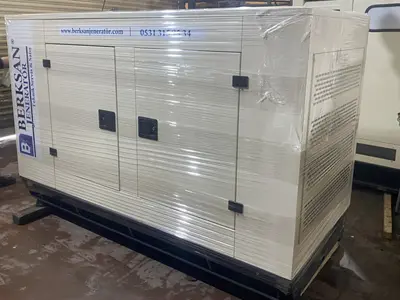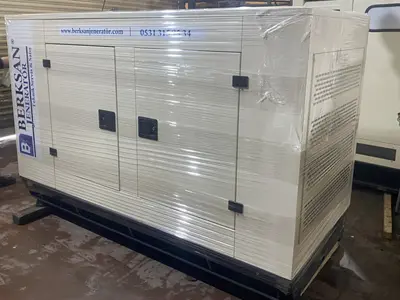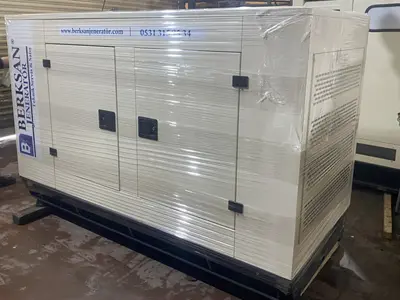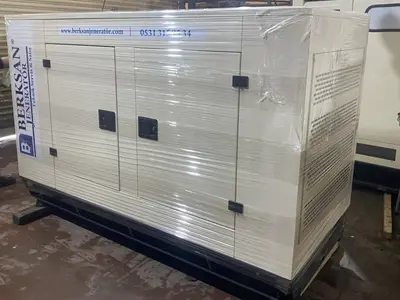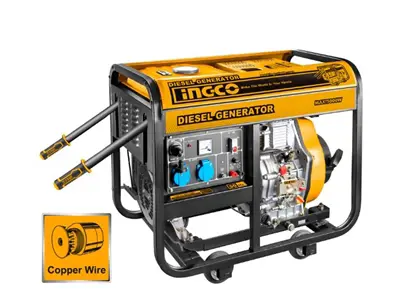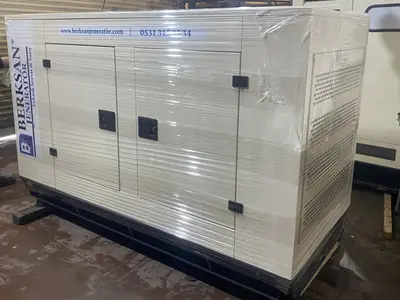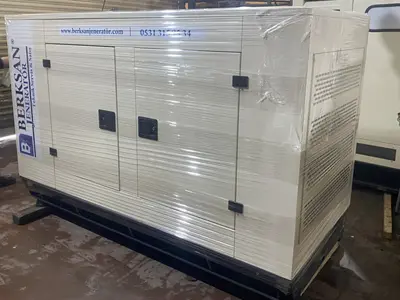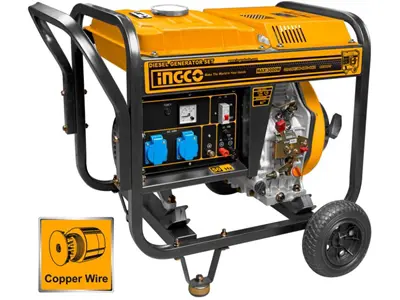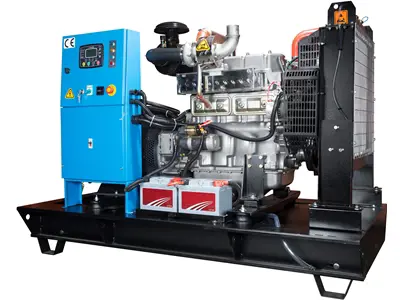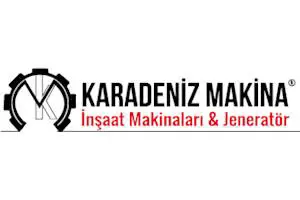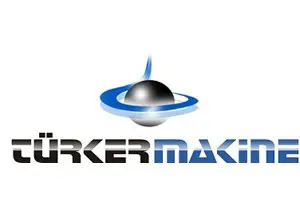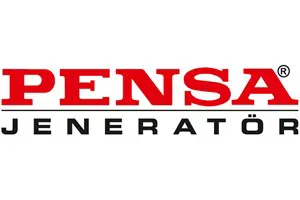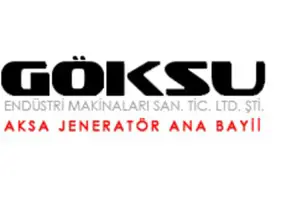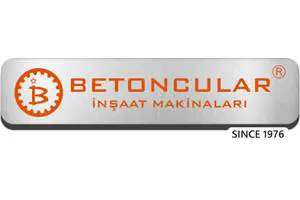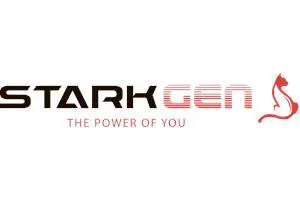11-30 KVA Diesel Generator kategorisinde ürün bulunamadı.
Benzer kategorideki diğer ilanlar listelenmektedir.What is a Diesel Generator?
A diesel generator is a device created by combining an internal combustion diesel engine with an electrical generator to generate electricity. Diesel generators are used to provide electrical power during power outages or independently from local power sources. The operation principle of diesel generators is quite simple: Diesel fuel is injected into the cylinders of the internal combustion engine and ignites at high pressure and temperature with the compression of the pistons in the combustion chamber. This combustion process generates mechanical energy that rotates the generator on a shaft. Diesel generator then converts the rotating mechanical energy into electrical energy.
- Durability: Diesel engines are generally durable and long-lasting. Therefore, diesel generators are suitable for long-term use.
- Fuel Efficiency: Diesel engines are more fuel-efficient compared to gasoline engines, resulting in lower operating costs.
- Reliability: Diesel generators generally perform well during power outages. They can provide quick start-up and stable operation under load.
- Long-Term Usage: Diesel generators can be designed to operate continuously under load for long periods.
- Noise: Diesel engines generally produce higher noise levels, which can create noise pollution.
- Emissions: Diesel engines can contribute to the formation of harmful particles and gases in exhaust emissions.
- Maintenance Requirement: Diesel engine generators may require regular maintenance, and maintenance costs can be high.
Diesel generators are used in various fields such as providing emergency power, meeting portable electricity needs, acting as backup power sources in industrial facilities, and in many other different areas.
Applications of Diesel Generators
Diesel generators are widely used in a variety of industrial, commercial, and personal settings. Here are some common areas where diesel generators are used:
- Emergency Power Supply: Diesel generators are used to provide uninterrupted power in vital locations such as hospitals, emergency services, fire stations, and telecommunication infrastructure during power outages.
- Industrial Facilities: Diesel generators are preferred in industrial facilities such as factories, production plants, and refineries to ensure uninterrupted production and operation of equipment.
- Construction Sites: Diesel generators are used in remote or underdeveloped construction sites where there is no electricity infrastructure.
- Agriculture and Farming: Diesel generators can be used to provide energy for irrigation systems, storage facilities, and agricultural machinery in remote agricultural areas.
- Events and Organizations: Diesel generators are preferred to provide temporary power at outdoor events, concerts, fairs, and other events.
- Hotels and Resorts: Diesel generators are used to provide service to customers in case of power outages at accommodation facilities.
- Data Centers: Diesel generators are used in data centers to ensure the continuous operation of servers.
- Maritime and Ships: Diesel generators are used in the maritime sector on ships, yachts, and boats to supply energy.
- Transport Vehicles: Diesel generators can be found in vehicles such as trucks, trains, and buses to meet their energy needs.
- Homes and Businesses: Diesel generators can be used to provide uninterrupted power in homes or small businesses.
Diesel generators can be portable or have fixed installations and come in different power capacities. Choosing the right capacity diesel generator is important depending on the usage area and needs.
Types of Diesel Generators
Diesel generators can be classified into various types based on their different purposes and power needs. Diesel Generators can vary depending on the facility and the region where they are used. Household generators can have a 7.5 kW diesel generator of power and can easily power appliances and machinery inside a home.
- Portable Diesel Generators: These generators generally have lower power capacities and are easy to transport. They are used in homes, small businesses, or places where portable power is needed. They can also be preferred in campsites, outdoor events, and construction sites.
- Standby Diesel Generators: Designed to be used as an emergency power source, they automatically kick in during a power outage to provide uninterrupted power. They are used in critical areas such as hospitals, data centers, and industrial facilities.
- Commercial Diesel Generators: These generators have medium to high power capacities and are commonly used in commercial and industrial facilities. They are preferred as backup power sources in factories, storage facilities, and large stores.
- Industrial Diesel Generators: These generators are designed for use in large industrial facilities and power plants with high power capacities. They generally have the capacity to operate continuously under heavy load.
- Generator Sets (Generator Groups): These are systems where multiple generators are combined. They are used to increase the ability to provide backup power in addition to having higher power capacities.
- Marine Diesel Generators: These generators are designed to be used on ships and boats in the maritime sector. They are produced to be resistant to seawater and meet the onboard energy needs.
- Vehicle Diesel Generators: These are generators integrated into transportation vehicles such as trucks, buses, and trains. They are used to meet the vehicle's internal electricity needs.
- Rack Mounted Diesel Generators: These generators are designed to occupy less space in places like data centers. They can be integrated into server racks.
- Hybrid Diesel Generators: These are generators where diesel engines are combined with renewable energy sources such as solar panels or wind turbines. This can increase energy efficiency.
- Diesel Silent Generators are specially designed generators that produce less noise compared to traditional diesel generators. Diesel Silent generators are preferred especially in areas where low noise levels are required or to prevent noise pollution.
The types of diesel generators differ based on needs and applications. Choosing the right type and capacity generator is important to ensure efficient operation and meet energy needs.
Diesel Generator Prices
The prices of diesel generators can vary significantly depending on a range of factors. These factors include the power capacity, brand, quality, features, intended use, and manufacturing quality of the generator. Additionally, geographical location, economic conditions, and the supply chain can also affect prices. For example, estimated price ranges of diesel generators with different power capacities provide a general overview for your facility, 10 kW diesel generator prices would vary depending on the current market conditions, geographical location, and the features. It is a good approach to contact the manufacturer or an authorized dealer directly to get the price of a specific generator. When buying used diesel generators for sale by owner, it is important to consider factors such as the quality, performance, durability, and maintenance requirements of the generator in addition to the price. Instead of opting for a cheap generator, focus on choosing a quality generator for long-term efficiency and reliability.








